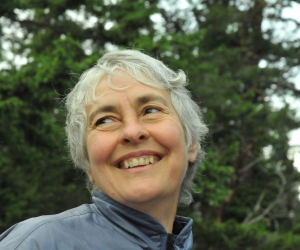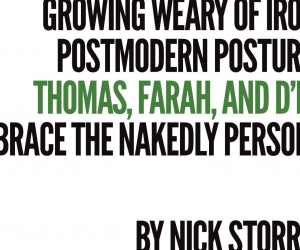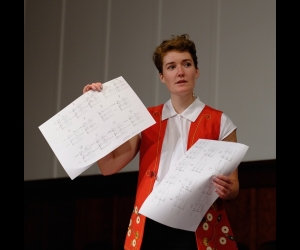Wolf Edwards’ various stories are so interesting and so curiously entwined that it’s hard to know where to start. Working in the fish-packing plants of Ucluelet, B.C., the ugly-duckling sibling of Tofino’s trendy swan? Playing guitar on the stage of some black-hole dive with anarcho-punk band Iskra? Swapping musical knowledge with British violinist Irvine Arditti, whose eponymous ensemble has performed all but one of Edwards’ string quartets? Absorbing informal lessons on contemporary art and Québécois culture with sonic philosopher Gilles Tremblay?
Edwards has done all these things and more. If he’s not composing, he might be playing banjo at an Irish ceilidh, or plotting to reopen Black Raven, his record store, or manicuring the gardens of the Victoria bourgeoisie, which is how he’s been making ends meet of late. But a good place to begin might be somewhere in the middle of his forty-four years—after the Sex Pistols and Black Flag led him to the electric guitar, but before he’d begun to attract the attention of performers such as Arditti, Montreal’s Quasar saxophone quartet, and the Société de musique contemporaine du Québec.
Towards the end of the last millennium, Edwards was putting in twenty-four-hour days at the University of Victoria’s music department, which sounds implausible. But not only was he studying from 8:30 a.m. to 10 p.m., he was sleeping there, too. “I lived in a practice room,” Edwards explains. “Since I was doing work-study at the time, I had access to the recording studio, the electronic studio, the instrument storage-room, the music hall, and the percussion studio. All of which enabled me to elude the security, and pretty much have access to all resources. To my surprise, there were others squatting the school as well—some students from east Europe who could not afford rent and such. We had a kind of secret musical world.
“It was a great time,” he adds.
A few years later, he was teaching—if only on a temporary contract—at that same school.
Endowed with a relentless appetite for the new, Edwards isn’t generally given to waxing nostalgic about his past. But he does flag his student days at UVic as one of a series of breakthroughs in his musical education, with the first coming circa 1986, while he was still living in Ucluelet. “What happened was my sister lent me a Sex Pistols cassette, actually,” he says. “I was already really into classic rock and all the mainstream sort of stuff, but I’d never heard punk music. She thought I would like it, and the energy was immediately interesting. I was captured by that, and also I was interested in the words. They were different.” The Pistols led the teenage guitarist to Crass, an English punk band and art collective, and to Black Flag, like-minded Californians. Both Crass and Black Flag espoused anarchist principles, and both kicked against the conformism that was already beginning to define punk as a musical genre.
“These bands were definitely a portal into other forms of music,” Edwards notes. “Music that was more abrasive, and challenging to the ear. These were the bands that moved me away from what I would call easy listening. But it was not only the ear that was challenged; it was also the mind. Anyone that knows anarchist and hardcore punk will know what I’m talking about.
“When I heard [Black Flag guitarist] Greg Ginn, I actually thought he couldn’t play,” he adds. “And because I thought he couldn’t play, I figured, ‘Well, I could play, too.’ So I immediately got a guitar and started playing with my friends from school. They were playing blues songs and Doors covers and stuff like that, and I came in and said, ‘I want to play punk music.’ So we started doing Ramones covers, Black Flag, Sex Pistols, SNFU, D.O.A. And then we all wrote originals. I was writing songs immediately.”
He still is, as can be heard on
Iskra’s Bandcamp site. He’s still playing guitar, too, and it was his desire to get better on his instrument that eventually led him to more formal styles of music composition. Following a move to the B.C. capital, curiosity led him to the Victoria Conservatory of Music, where he enrolled in its classical-guitar program, studying with Alexander Dunn. It was another stroke of luck: Dunn recognized Edwards’ talent, picked up on the fact that he was bored with the conventional repertoire, and knew just how to fix that.
“He had studied with Roger Reynolds and Brian Ferneyhough, but he didn’t talk about it because he didn’t think anybody would be interested,” Edwards explains. “And so one day I was playing either a Brouwer piece or a Takemitsu piece, and I told Alex there was something about it I really liked that was different than the other stuff. He said, ‘Well, if you like that, you should really check out the master writers of the twentieth century.’ And I asked, “Well, like who?’”
A list of ten essential composers was quickly provided, and Edwards proved a quick study. “As soon as I heard that music, I was immediately interested,” he says. “Especially Stockhausen. I just loved it, when I heard Stimmung and pieces like that. And Brian Ferneyhough—the energy, the frantic energy. Having been playing punk for so long, I think it was the energy in Ferneyhough and some of the early Stockhausen stuff that captured my attention. I liked the dissonance; I liked the insane rhythms; I liked the flow; I liked the compositional ideas. Everything about it, I liked. Varèse, too. I like all the stuff with percussion.”
Edwards quickly transferred to UVic’s composition department, moving on from there to independent study, notably with Tremblay and the Israeli composer Chaya Czernowin. Score analysis, he says, was integral to his growing understanding of musical complexity, and one can still hear echoes in some of his writing of the hours he’s spent poring over scores by Ferneyhough, Varèse, Stockhausen, Helmut Lachenmann, and Iannis Xenakis. (Sometimes the homages are explicit: Irons, written for the SMCQ, is quite literally Edwards attempting to rewrite Varèse’s Deserts.) But his methodology is different, incorporating the anarchist philosophy he absorbed from Crass, Black Flag, and Michel Foucault, among others.
“My works always begin with one musical idea,” he says. “Since I work with at least three different layers of sound simultaneously, I will generally consider only one, and then let the others react; kind of like a fugal subject, but with no rules. I consider the musical material and work with what comes to mind. It’s very journalistic in its approach. One day will be written, and then there is no telling what the next will bring, making everything a kind of organic unfolding. Often my decisions will be based upon a sound I hear in whatever environment I might experience. Such sounds will then be enhanced by a kind of orchestration, or various classical or nonclassical techniques that I want to explore. I consider my type of writing to be a performance in writing. That is, I don’t sketch things out, I simply write according to ideas that are in my mind in the moment of creation. I want the creative act to be in the moment, as it were. It’s an improvisation.”
Similarly, Edwards rejects conventional notions of musical hierarchy: the composer, he stresses, should ideally be a collaborator rather than a dictator of ideas. “I view all work with musicians as nonauthoritarian practice,” he says. “Thus I see no contradiction between creating musical art and being anarchist. If the musicians I happen to be working with exude any kind of authoritarian attitudes, I am quick to dispel it, even to the detriment of the relationship. I view such attitudes as being nonproductive, in a cultural–political sense. Everything I do is open, including my scores. I am always willing and excited to change my writing before, during, or after the rehearsal phase. I am happy to hear and respond to any ideas offered by whoever I am working with.
“The Quasar Saxophone Quartet, for example, whom I’ve worked with many times over the last decade, have often suggested changes to my scores. If we agree to the changes, then the changes are made. We take into consideration the music and what we are trying to achieve—the entire process is collaborative. The music remains alive, organic, and malleable. In this way, my craft is enhanced. For the performers, the score becomes more interesting and clear. They have a major part in the production. It all works together. It’s anarchism in action. There are no laws limiting how we put our music together.”
Quasar’s Marie-Chantal Leclair stresses the collaborative nature of their interplay. “Wolf is bringing ideas in terms of sounds, and then we work together and say ‘Yes. No. Yes. No.’ And then, together, we find a way to say yes,” the Montreal-based musician explains. “There’s a lot of exploration with Wolf in terms of timbres, you know, like power sounds and distortion sounds. He always comes up with a very clear idea, and can express it very clearly, but then in the making of it we have to work together to find a way to do it—to learn how to write it down, how to express it.
“He has a strong will to say something, to comment,” she adds. “And it’s not like he’s looking for attention, but he does want to say to people, ‘Hey!’ And he has a strong focus, but he’s always looking for development, and he’s always moving forward. It’s about sound, what he’s doing. It’s very concrete, perhaps. And it’s very sophisticated. Some people would say ‘Ah, it’s lots of noise,’ you know. It’s very strong and yet sophisticated at the same time.”
That urge to comment has led Edwards to give some of his pieces provocative titles, such as Cluster Bomb Unit, which guitarist Adrian Verdejo, who commissioned the piece, and violist Marcus Takizawa premiered in Vancouver last year; or Predator Drone MQ-1, one of several works commissioned by Quasar. “People think, Oh yeah. I get it. He’s trying to replicate the sound of violence or something. And there is a bit of that, but I think about that later,” he says. “But I do sometimes get into this idea of, like, ‘What would it sound like to be strafed by phosphorous weapons?’ It’s definitely there. And then there’s another part of me that’s kind of nasty, that thinks, I don’t want North Americans to have a kind of laissez-faire, ho-hum time when they listen to my music about the violence perpetrated by our society that they’d rather not think about. I want it to be kind of in your face. I want the comment to be in your face and I want the music to be in your face—the more unsettling the better.
“But I’m not too comfortable with saying that’s what I’m trying to do,” Edwards adds. “I don’t want to be a composer who just does that as some kind of shtick. I’m writing music that I want to hear.”
Homepage slider image: From first page of score for Wolf Edwards' Cluster Bomb Unit, commissioned by guitarist Adrian Verdejo, who premiered the piece with violist Marcus Takizawa November 2013 at Vancouver's Chambercon festival (see video above). Top image of Wolf Edwards by: Daniel Buchinski. Middle image: Edwards performing with Iskra in Prague in 2013.



